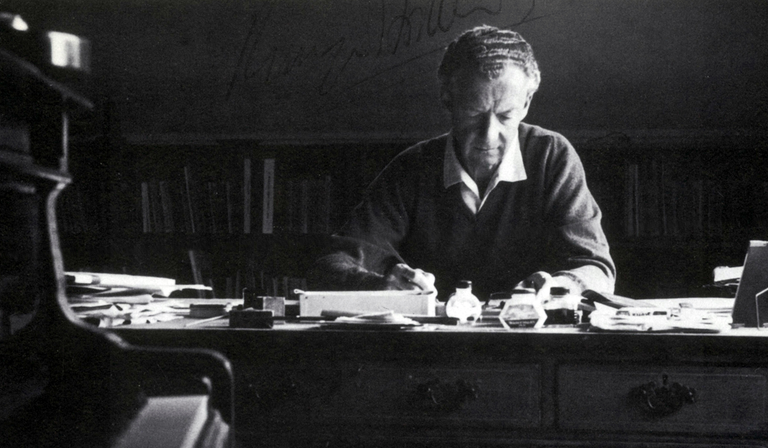As regular readers of this column will know, Britten’s War Requiem is something I return to—a lot. A couple of months ago, I was performing some Schubert Lieder in Warsaw and happened to mention that, by the end of this year, I will have sung in 99 performances of the piece. The Warsaw promoter promptly engaged me for my 100th, next March. Only a couple of performances in St Louis, Missouri, stand between me and my personal Requiem century.
It was nearly 10 years ago that, sitting in a War Requiem rehearsal in Montreal, I had the idea of writing a book about this work. Or rather, around it. A book which would examine in a loose and allusive way, with many digressions and detours, the history of Britten’s masterwork and its possible meanings: ideas that flow from the texts (the Latin mass for the dead and war poems by Wilfred Owen); the music (delivered by a symphony orchestra, a chamber orchestra, a choir, a children’s choir, three soloists and—when available—a mighty pipe organ); and a panoply of contexts. The Requiem, commissioned for the consecration of the new Coventry Cathedral, summons up the ghosts of the First World War, memorialises the second and was premiered, in 1962, in the midst of worries about a third. When we perform it today, we think of Ukraine and of Gaza.
What spurred me all those years ago to write a proposal for the book was the impending anniversary year of 2018—100 years since the Armistice. With such a large undertaking, touching on so many diverse musical, historical and poetic subjects, I inevitably missed my deadline, and other projects intervened. But I have returned to it, and now writing about the War Requiem seems even more timely.
♦♦♦
And so it is that—midway through writing the text and marooned in Rome for six weeks of rehearsals (opera singer maroonery isn’t always unpleasant)—I’m trying to figure my way around the very core of the Requiem, the “Offertorium”. It juxtaposes a choral version of the relevant section of the Latin mass for the dead with a setting (for chamber orchestra, tenor and baritone) of Wilfred Owen’s retelling of the Abraham and Isaac story. Owen’s version, “The Parable of the Old Man and the Young”, is faithful to its biblical source until its denouement. In the original, God has instructed Abraham to bind and sacrifice his son Isaac, but relents (via an angel) at the last moment. In Owen’s reworking, meant as a mordant commentary on the Western Front, Abraham “would not so, but slew his son, / And half the seed of Europe, one by one”.
I call the “Offertorium” the core of the work not only because it is placed literally at the centre of the mass (when we reach the end of the movement in performance, I know we’e more than halfway through) but, more importantly because, in writing about it, I’ve found that it raises a whole host of interacting issues that encircle the moral landscape of war in the 20th century.
The story of the binding of Isaac, known as the Akedah in the Jewish tradition, has inspired numerous literary, visual, philosophical and musical responses, from Bob Dylan’s “Highway 61 Revisited”—“God said to Abraham, kill me a son”—to Søren Kierkegaard’s puzzling Fear and Trembling, a founding text of proto-existentialism. Britten had already set a medieval version in his “Canticle II” in the 1950s; the theme of the sacrifice of the innocent closely connected to his opera Billy Budd.
One of the problems that has occurred to me while sitting through many rehearsals of the War Requiem is Britten’s avoidance of any direct reckoning with one of the defining horrors of the Second World War: the extermination of the greater part of European Jewry. Britten had witnessed the effect of Nazi atrocities on a visit to Bergen-Belsen in July 1945. His immediate and anguished response on his return to the UK was a coruscatingly guilt-drenched setting of John Donne’s Holy Sonnets, a brilliant act of displacement for a hardcore pacifist.
The years around the composition and premiere of the Requiem saw a transformation in attitudes towards what was increasingly referred to as “the Holocaust”. The Eichmann trial began on 11th April 1961. It was widely covered in the British press and broadcast on television in dozens of countries. Evils at least partly forgotten were remembered and revisited in Jerusalem and elsewhere. One cannot listen to a “war” requiem and not have those evils come to mind.
In the “Offertorium”, obliquely—and almost certainly unconsciously—Britten has embedded a version of a story whose resonances have a deep if troubling connection with the Shoah. Not only through its representation of the abortive burnt offering, or holocaust, of Isaac, but also through the writings of Jewish thinkers such as Elie Wiesel, an Auschwitz survivor, who saw in the timeless tale of the binding of Isaac a way to talk about survival and to interrogate the meaning of suffering. This infuriated secular-minded survivors, including Primo Levi; and a theology of the Holocaust would be, as Wiesel himself said, an abomination.
Nevertheless, in a work which brings together religion and war, as Britten’s War Requiem does, the issue of theodicy—the vindication of divine providence in the face of the existence of evil—is surely unavoidable.













